The Value of Critical Thinking in Nursing
- How Nurses Use Critical Thinking
- How to Improve Critical Thinking
- Common Mistakes

Some experts describe a person’s ability to question belief systems, test previously held assumptions, and recognize ambiguity as evidence of critical thinking. Others identify specific skills that demonstrate critical thinking, such as the ability to identify problems and biases, infer and draw conclusions, and determine the relevance of information to a situation.
Nicholas McGowan, BSN, RN, CCRN, has been a critical care nurse for 10 years in neurological trauma nursing and cardiovascular and surgical intensive care. He defines critical thinking as “necessary for problem-solving and decision-making by healthcare providers. It is a process where people use a logical process to gather information and take purposeful action based on their evaluation.”
“This cognitive process is vital for excellent patient outcomes because it requires that nurses make clinical decisions utilizing a variety of different lenses, such as fairness, ethics, and evidence-based practice,” he says.

How Do Nurses Use Critical Thinking?
Successful nurses think beyond their assigned tasks to deliver excellent care for their patients. For example, a nurse might be tasked with changing a wound dressing, delivering medications, and monitoring vital signs during a shift. However, it requires critical thinking skills to understand how a difference in the wound may affect blood pressure and temperature and when those changes may require immediate medical intervention.
Nurses care for many patients during their shifts. Strong critical thinking skills are crucial when juggling various tasks so patient safety and care are not compromised.
Jenna Liphart Rhoads, Ph.D., RN, is a nurse educator with a clinical background in surgical-trauma adult critical care, where critical thinking and action were essential to the safety of her patients. She talks about examples of critical thinking in a healthcare environment, saying:
“Nurses must also critically think to determine which patient to see first, which medications to pass first, and the order in which to organize their day caring for patients. Patient conditions and environments are continually in flux, therefore nurses must constantly be evaluating and re-evaluating information they gather (assess) to keep their patients safe.”
The COVID-19 pandemic created hospital care situations where critical thinking was essential. It was expected of the nurses on the general floor and in intensive care units. Crystal Slaughter is an advanced practice nurse in the intensive care unit (ICU) and a nurse educator. She observed critical thinking throughout the pandemic as she watched intensive care nurses test the boundaries of previously held beliefs and master providing excellent care while preserving resources.
“Nurses are at the patient’s bedside and are often the first ones to detect issues. Then, the nurse needs to gather the appropriate subjective and objective data from the patient in order to frame a concise problem statement or question for the physician or advanced practice provider,” she explains.
Top 5 Ways Nurses Can Improve Critical Thinking Skills
We asked our experts for the top five strategies nurses can use to purposefully improve their critical thinking skills.
Case-Based Approach
Slaughter is a fan of the case-based approach to learning critical thinking skills.
In much the same way a detective would approach a mystery, she mentors her students to ask questions about the situation that help determine the information they have and the information they need. “What is going on? What information am I missing? Can I get that information? What does that information mean for the patient? How quickly do I need to act?”
Consider forming a group and working with a mentor who can guide you through case studies. This provides you with a learner-centered environment in which you can analyze data to reach conclusions and develop communication, analytical, and collaborative skills with your colleagues.
Practice Self-Reflection
Rhoads is an advocate for self-reflection. “Nurses should reflect upon what went well or did not go well in their workday and identify areas of improvement or situations in which they should have reached out for help.” Self-reflection is a form of personal analysis to observe and evaluate situations and how you responded.
This gives you the opportunity to discover mistakes you may have made and to establish new behavior patterns that may help you make better decisions. You likely already do this. For example, after a disagreement or contentious meeting, you may go over the conversation in your head and think about ways you could have responded.
It’s important to go through the decisions you made during your day and determine if you should have gotten more information before acting or if you could have asked better questions.
During self-reflection, you may try thinking about the problem in reverse. This may not give you an immediate answer, but can help you see the situation with fresh eyes and a new perspective. How would the outcome of the day be different if you planned the dressing change in reverse with the assumption you would find a wound infection? How does this information change your plan for the next dressing change?
Develop a Questioning Mind
McGowan has learned that “critical thinking is a self-driven process. It isn’t something that can simply be taught. Rather, it is something that you practice and cultivate with experience. To develop critical thinking skills, you have to be curious and inquisitive.”
To gain critical thinking skills, you must undergo a purposeful process of learning strategies and using them consistently so they become a habit. One of those strategies is developing a questioning mind. Meaningful questions lead to useful answers and are at the core of critical thinking .
However, learning to ask insightful questions is a skill you must develop. Faced with staff and nursing shortages , declining patient conditions, and a rising number of tasks to be completed, it may be difficult to do more than finish the task in front of you. Yet, questions drive active learning and train your brain to see the world differently and take nothing for granted.
It is easier to practice questioning in a non-stressful, quiet environment until it becomes a habit. Then, in the moment when your patient’s care depends on your ability to ask the right questions, you can be ready to rise to the occasion.
Practice Self-Awareness in the Moment
Critical thinking in nursing requires self-awareness and being present in the moment. During a hectic shift, it is easy to lose focus as you struggle to finish every task needed for your patients. Passing medication, changing dressings, and hanging intravenous lines all while trying to assess your patient’s mental and emotional status can affect your focus and how you manage stress as a nurse .
Staying present helps you to be proactive in your thinking and anticipate what might happen, such as bringing extra lubricant for a catheterization or extra gloves for a dressing change.
By staying present, you are also better able to practice active listening. This raises your assessment skills and gives you more information as a basis for your interventions and decisions.
Use a Process
As you are developing critical thinking skills, it can be helpful to use a process. For example:
- Ask questions.
- Gather information.
- Implement a strategy.
- Evaluate the results.
- Consider another point of view.
These are the fundamental steps of the nursing process (assess, diagnose, plan, implement, evaluate). The last step will help you overcome one of the common problems of critical thinking in nursing — personal bias.
Common Critical Thinking Pitfalls in Nursing
Your brain uses a set of processes to make inferences about what’s happening around you. In some cases, your unreliable biases can lead you down the wrong path. McGowan places personal biases at the top of his list of common pitfalls to critical thinking in nursing.
“We all form biases based on our own experiences. However, nurses have to learn to separate their own biases from each patient encounter to avoid making false assumptions that may interfere with their care,” he says. Successful critical thinkers accept they have personal biases and learn to look out for them. Awareness of your biases is the first step to understanding if your personal bias is contributing to the wrong decision.
New nurses may be overwhelmed by the transition from academics to clinical practice, leading to a task-oriented mindset and a common new nurse mistake ; this conflicts with critical thinking skills.
“Consider a patient whose blood pressure is low but who also needs to take a blood pressure medication at a scheduled time. A task-oriented nurse may provide the medication without regard for the patient’s blood pressure because medication administration is a task that must be completed,” Slaughter says. “A nurse employing critical thinking skills would address the low blood pressure, review the patient’s blood pressure history and trends, and potentially call the physician to discuss whether medication should be withheld.”
Fear and pride may also stand in the way of developing critical thinking skills. Your belief system and worldview provide comfort and guidance, but this can impede your judgment when you are faced with an individual whose belief system or cultural practices are not the same as yours. Fear or pride may prevent you from pursuing a line of questioning that would benefit the patient. Nurses with strong critical thinking skills exhibit:
- Learn from their mistakes and the mistakes of other nurses
- Look forward to integrating changes that improve patient care
- Treat each patient interaction as a part of a whole
- Evaluate new events based on past knowledge and adjust decision-making as needed
- Solve problems with their colleagues
- Are self-confident
- Acknowledge biases and seek to ensure these do not impact patient care
An Essential Skill for All Nurses
Critical thinking in nursing protects patient health and contributes to professional development and career advancement. Administrative and clinical nursing leaders are required to have strong critical thinking skills to be successful in their positions.
By using the strategies in this guide during your daily life and in your nursing role, you can intentionally improve your critical thinking abilities and be rewarded with better patient outcomes and potential career advancement.
Frequently Asked Questions About Critical Thinking in Nursing
How are critical thinking skills utilized in nursing practice.
Nursing practice utilizes critical thinking skills to provide the best care for patients. Often, the patient’s cause of pain or health issue is not immediately clear. Nursing professionals need to use their knowledge to determine what might be causing distress, collect vital information, and make quick decisions on how best to handle the situation.
How does nursing school develop critical thinking skills?
Nursing school gives students the knowledge professional nurses use to make important healthcare decisions for their patients. Students learn about diseases, anatomy, and physiology, and how to improve the patient’s overall well-being. Learners also participate in supervised clinical experiences, where they practice using their critical thinking skills to make decisions in professional settings.
Do only nurse managers use critical thinking?
Nurse managers certainly use critical thinking skills in their daily duties. But when working in a health setting, anyone giving care to patients uses their critical thinking skills. Everyone — including licensed practical nurses, registered nurses, and advanced nurse practitioners —needs to flex their critical thinking skills to make potentially life-saving decisions.
Meet Our Contributors

Crystal Slaughter is a core faculty member in Walden University’s RN-to-BSN program. She has worked as an advanced practice registered nurse with an intensivist/pulmonary service to provide care to hospitalized ICU patients and in inpatient palliative care. Slaughter’s clinical interests lie in nursing education and evidence-based practice initiatives to promote improving patient care.

Jenna Liphart Rhoads is a nurse educator and freelance author and editor. She earned a BSN from Saint Francis Medical Center College of Nursing and an MS in nursing education from Northern Illinois University. Rhoads earned a Ph.D. in education with a concentration in nursing education from Capella University where she researched the moderation effects of emotional intelligence on the relationship of stress and GPA in military veteran nursing students. Her clinical background includes surgical-trauma adult critical care, interventional radiology procedures, and conscious sedation in adult and pediatric populations.

Nicholas McGowan is a critical care nurse with 10 years of experience in cardiovascular, surgical intensive care, and neurological trauma nursing. McGowan also has a background in education, leadership, and public speaking. He is an online learner who builds on his foundation of critical care nursing, which he uses directly at the bedside where he still practices. In addition, McGowan hosts an online course at Critical Care Academy where he helps nurses achieve critical care (CCRN) certification.

Why Critical Thinking Is Important in Nursing
Most nursing professionals have natural nurturing abilities, a desire to give others support, and an appreciation for science and anatomy. Successful nurses also possess a skill that is often overlooked: they can think critically.
A critical thinker will identify the problem, determine the best solution, and choose the most effective method. Critical thinkers evaluate the execution of a plan to see if it was effective and if it could have been done better.
The ability to think critically has multiple applications in your life, as you can see. But Why is critical thinking important in nursing? Learn why and how you can improve this skill by reading on.

Why Are Critical Thinking Skills in Nursing Important?
Critical thinking is an essential skill for nursing students to have. It’s not something that it can teach in a classroom, and it must be developed over time through experience and practice.
Critical thinking is the process of applying logic and reason to make decisions or solve problems. The ability to think critically will help you make better decisions on your own and collaborate with others when solving problems – both are essential skills for nurses.
Nursing has always been a profession that relies on critical thinking. Nurses are constantly faced with new situations and problems, which they need to think critically about to solve.
Critical thinking is essential for nurses because it helps them make decisions based on the available information and their past experiences and knowledge of the field. It also allows nurses to plan before making any changes to be most effective as possible.
It is an essential skill for nurses to have to provide the best care possible. Critical thinkers can comprehend a problem and think about how they can solve it, rather than reactively or automatically.
Critical thinking is a crucial skill for doctors, nurses, and other health care providers.
How can you develop your critical thinking skills?
As you know, learning doesn’t end when you graduate from nursing school. You must continue to grow as a professional and develop your critical thinking skills.
Critical thinkers are better problem solvers than others in the same situation because they examine all the facts before coming up with solutions. They can also take many different perspectives into account when solving problems.
It’s easy for people to come to conclusions too quickly, but those who think critically will avoid this trap by first looking at every possible angle.
When faced with difficult decisions, these nurses won’t just rely on their gut feelings or what seems right according to society’s norms; instead, they’ll analyze all available information carefully until they develop the best solution.
Critical thinking is also crucial because it helps nurses avoid making mistakes in their work by providing them with a way to examine each situation and identify any potential risks or problems that may arise from subsequent actions before they take place.
It’s not enough for you to have empathy if your compassion isn’t backed up by critical thought and understanding of how certain decisions might affect others in various circumstances, so keep learning ways to become more thoughtful about the world around you.
The skills involved in being a good nurse are many and varied, but one thing all nurses need, regardless of what specialty they choose, is critical solid thinking abilities.
Reasons Critical Thinking In Nursing Is Important
Nurses’ experiences often include making life-altering decisions, establishing authority in stressful situations, and helping patients and their loved ones cope with some of the most stressful and emotional times of their lives. Critical thinking is an essential aspect of nursing.
Following are the reasons:
- Nurses’ critical thinking has a significant impact on patient care
- Recognizing changes in patient status is essential
- It’s essential to an honest and open exchange of ideas
- It enables you to ensure patient safety
- Nurses can find quick fixes with it
- Improvements can be made through critical thinking
- It Contributes to Rational Decision Making
Further critical thinking is essential to nursing because nurses can establish authority in a stressful situation, such as issuing orders or administering care when needed.
This can be difficult because it may require balancing medical expertise with empathy and compassion towards patients’ feelings, leading them to question your judgment at some point in time.
Another reason this skill set is crucial involves making decisions that will have life-changing effects on a patient’s health and well-being.
These are often irreversible choices that only you know how much weight they carry within the context of each situation, so you need to make sure all factors are carefully considered before deciding what action must be taken next without hesitation.
Skills that Critical Thinkers Need
When it comes to critical thinking, some skills are more important than others. Using a framework known as the Nursing Process, some of these skills are applied to patient care. The most important skills are:
Interpretation: Understanding and explaining a specific event or piece of information.
Analysis: Studying data based on subjective and objective information to determine the best course of action.
Evaluation: Here, you assess the information you received. Is the information accurate, reliable, and credible? The ability to determine if outcomes have been fully achieved requires this skill as well.
The nurse can then use clinical reasoning to determine what the problem is based on those three skills.
The decisions need to be based on sound reasoning:
Provide a clear, concise explanation of your conclusions. Nurses should provide a rationale for their answers.
Self-regulation – You need to be aware of your thought processes. As a result, you must reflect on the process that led to your conclusion. In this process, you should self-correct as necessary. Keep an eye out for bias and incorrect assumptions.
Critical Thinking Pitfalls
It can fall by the wayside when it’s not seen as necessary or when there are more pressing issues.
- Critical thinking is important in nursing because it can fall by the wayside when it’s not seen as an essential or more pressing issue.
- It can be difficult to think critically about complex, ambiguous situations with a shortage of information and time in healthcare settings.
- If we don’t use critical thinking skills, problems might go undetected or unresolved, leading to further complications down the road.
Sometimes nurses can’t differentiate between a less acute clinical problem and one that needs immediate attention. When a large amount of complex data must be processed in a time-critical manner, errors can also occur.
Conclusion:
Nurses cannot overstate the importance of critical thinking. The clinical presentations of patients are diverse. To provide safe, high-quality care, nurses must make rational clinical decisions and solve problems. Nurses need critical thinking skills to handle increasingly complex cases.
- Why Is Research Important in Nursing?
- Why Is the Nursing Process Important?
- Why Compassion is Important in Nursing
Download Nurse Bingo Today!
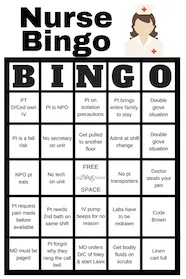
Liven up any shift with a fun game of bingo. See who can fill a row first! Fill a whole card and lose grip with reality.
Your privacy is protected. We will never spam you.
About The Author
Brittney wilson, bsn, rn, related posts.
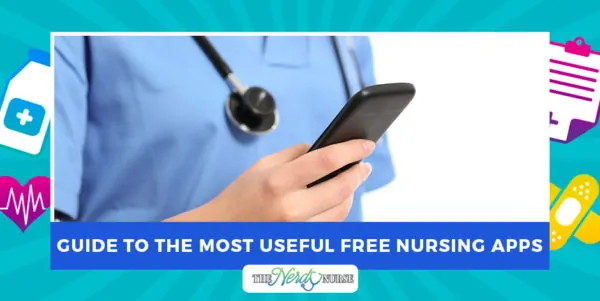
A Guide To The Most Useful Free Nursing Apps
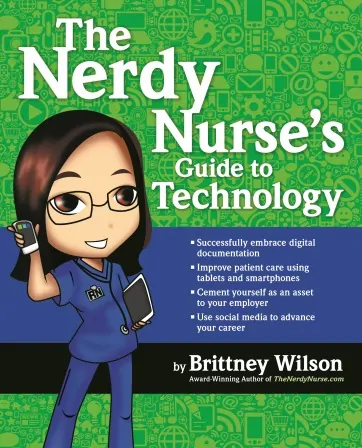
The Nerdy Nurse’s Guide to Technology: The Book

Best Medical Dictionaries for Nurses

Why Is Documentation Important in Nursing?
Leave a comment cancel reply.
Your email address will not be published. Required fields are marked *
Save my name, email, and website in this browser for the next time I comment.
This site uses Akismet to reduce spam. Learn how your comment data is processed .
Start typing and press enter to search
What is Critical Thinking in Nursing? (With Examples, Importance, & How to Improve)

Successful nursing requires learning several skills used to communicate with patients, families, and healthcare teams. One of the most essential skills nurses must develop is the ability to demonstrate critical thinking. If you are a nurse, perhaps you have asked if there is a way to know how to improve critical thinking in nursing? As you read this article, you will learn what critical thinking in nursing is and why it is important. You will also find 18 simple tips to improve critical thinking in nursing and sample scenarios about how to apply critical thinking in your nursing career.
What is Critical Thinking in Nursing?
4 reasons why critical thinking is so important in nursing, 1. critical thinking skills will help you anticipate and understand changes in your patient’s condition., 2. with strong critical thinking skills, you can make decisions about patient care that is most favorable for the patient and intended outcomes., 3. strong critical thinking skills in nursing can contribute to innovative improvements and professional development., 4. critical thinking skills in nursing contribute to rational decision-making, which improves patient outcomes., what are the 8 important attributes of excellent critical thinking in nursing, 1. the ability to interpret information:, 2. independent thought:, 3. impartiality:, 4. intuition:, 5. problem solving:, 6. flexibility:, 7. perseverance:, 8. integrity:, examples of poor critical thinking vs excellent critical thinking in nursing, 1. scenario: patient/caregiver interactions, poor critical thinking:, excellent critical thinking:, 2. scenario: improving patient care quality, 3. scenario: interdisciplinary collaboration, 4. scenario: precepting nursing students and other nurses, how to improve critical thinking in nursing, 1. demonstrate open-mindedness., 2. practice self-awareness., 3. avoid judgment., 4. eliminate personal biases., 5. do not be afraid to ask questions., 6. find an experienced mentor., 7. join professional nursing organizations., 8. establish a routine of self-reflection., 9. utilize the chain of command., 10. determine the significance of data and decide if it is sufficient for decision-making., 11. volunteer for leadership positions or opportunities., 12. use previous facts and experiences to help develop stronger critical thinking skills in nursing., 13. establish priorities., 14. trust your knowledge and be confident in your abilities., 15. be curious about everything., 16. practice fair-mindedness., 17. learn the value of intellectual humility., 18. never stop learning., 4 consequences of poor critical thinking in nursing, 1. the most significant risk associated with poor critical thinking in nursing is inadequate patient care., 2. failure to recognize changes in patient status:, 3. lack of effective critical thinking in nursing can impact the cost of healthcare., 4. lack of critical thinking skills in nursing can cause a breakdown in communication within the interdisciplinary team., useful resources to improve critical thinking in nursing, youtube videos, my final thoughts, frequently asked questions answered by our expert, 1. will lack of critical thinking impact my nursing career, 2. usually, how long does it take for a nurse to improve their critical thinking skills, 3. do all types of nurses require excellent critical thinking skills, 4. how can i assess my critical thinking skills in nursing.
• Ask relevant questions • Justify opinions • Address and evaluate multiple points of view • Explain assumptions and reasons related to your choice of patient care options
5. Can I Be a Nurse If I Cannot Think Critically?

We use cookies on our website to support technical features that enhance your user experience, and to help us improve our website. By continuing to use this website, you accept our privacy policy .
- Student Login
- Call Us: 888-549-6755
- 888-559-6763
- Search site Search our site Search Now Close
- Request Info
Skip to Content (Press Enter)
Why Critical Thinking Skills in Nursing Matter (And What You Can Do to Develop Them)
By Hannah Meinke on 07/05/2021
- Share on Facebook
- Share on LinkedIn
- Share on Pinterest
- Share on Twitter
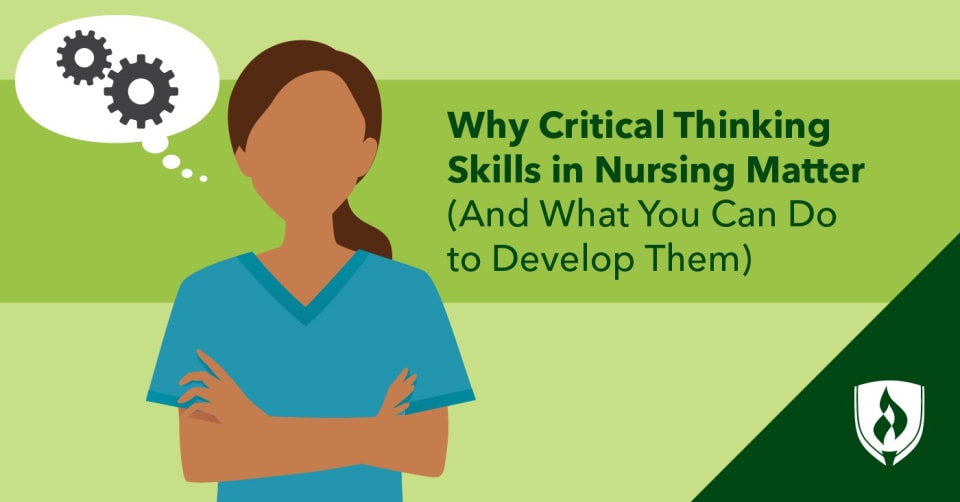
The nursing profession tends to attract those who have natural nurturing abilities, a desire to help others, and a knack for science or anatomy. But there is another important skill that successful nurses share, and it's often overlooked: the ability to think critically.
Identifying a problem, determining the best solution and choosing the most effective method to solve the program are all parts of the critical thinking process. After executing the plan, critical thinkers reflect on the situation to figure out if it was effective and if it could have been done better. As you can see, critical thinking is a transferable skill that can be leveraged in several facets of your life.
But why is it so important for nurses to use? We spoke with several experts to learn why critical thinking skills in nursing are so crucial to the field, the patients and the success of a nurse. Keep reading to learn why and to see how you can improve this skill.
Why are critical thinking skills in nursing important?
You learn all sorts of practical skills in nursing school, like flawlessly dressing a wound, taking vitals like a pro or starting an IV without flinching. But without the ability to think clearly and make rational decisions, those skills alone won’t get you very far—you need to think critically as well.
“Nurses are faced with decision-making situations in patient care, and each decision they make impacts patient outcomes. Nursing critical thinking skills drive the decision-making process and impact the quality of care provided,” says Georgia Vest, DNP, RN and senior dean of nursing at the Rasmussen University School of Nursing.
For example, nurses often have to make triage decisions in the emergency room. With an overflow of patients and limited staff, they must evaluate which patients should be treated first. While they rely on their training to measure vital signs and level of consciousness, they must use critical thinking to analyze the consequences of delaying treatment in each case.
No matter which department they work in, nurses use critical thinking in their everyday routines. When you’re faced with decisions that could ultimately mean life or death, the ability to analyze a situation and come to a solution separates the good nurses from the great ones.
How are critical thinking skills acquired in nursing school?
Nursing school offers a multitude of material to master and upholds high expectations for your performance. But in order to learn in a way that will actually equip you to become an excellent nurse, you have to go beyond just memorizing terms. You need to apply an analytical mindset to understanding course material.
One way for students to begin implementing critical thinking is by applying the nursing process to their line of thought, according to Vest. The process includes five steps: assessment, diagnosis, outcomes/planning, implementation and evaluation.
“One of the fundamental principles for developing critical thinking is the nursing process,” Vest says. “It needs to be a lived experience in the learning environment.”
Nursing students often find that there are multiple correct solutions to a problem. The key to nursing is to select the “the most correct” solution—one that will be the most efficient and best fit for that particular situation. Using the nursing process, students can narrow down their options to select the best one.
When answering questions in class or on exams, challenge yourself to go beyond simply selecting an answer. Start to think about why that answer is correct and what the possible consequences might be. Simply memorizing the material won’t translate well into a real-life nursing setting.
How can you develop your critical thinking skills as a nurse?
As you know, learning doesn’t stop with graduation from nursing school. Good nurses continue to soak up knowledge and continually improve throughout their careers. Likewise, they can continue to build their critical thinking skills in the workplace with each shift.
“To improve your critical thinking, pick the brains of the experienced nurses around you to help you get the mindset,” suggests Eileen Sollars, RN ADN, AAS. Understanding how a seasoned nurse came to a conclusion will provide you with insights you may not have considered and help you develop your own approach.
The chain of command can also help nurses develop critical thinking skills in the workplace.
“Another aid in the development of critical thinking I cannot stress enough is the utilization of the chain of command,” Vest says. “In the chain of command, the nurse always reports up to the nurse manager and down to the patient care aide. Peers and fellow healthcare professionals are not in the chain of command. Clear understanding and proper utilization of the chain of command is essential in the workplace.”
How are critical thinking skills applied in nursing?
“Nurses use critical thinking in every single shift,” Sollars says. “Critical thinking in nursing is a paramount skill necessary in the care of your patients. Nowadays there is more emphasis on machines and technical aspects of nursing, but critical thinking plays an important role. You need it to understand and anticipate changes in your patient's condition.”
As a nurse, you will inevitably encounter a situation in which there are multiple solutions or treatments, and you'll be tasked with determining the solution that will provide the best possible outcome for your patient. You must be able to quickly and confidently assess situations and make the best care decision in each unique scenario. It is in situations like these that your critical thinking skills will direct your decision-making.
Do critical thinking skills matter more for nursing leadership and management positions?
While critical thinking skills are essential at every level of nursing, leadership and management positions require a new level of this ability.
When it comes to managing other nurses, working with hospital administration, and dealing with budgets, schedules or policies, critical thinking can make the difference between a smooth-running or struggling department. At the leadership level, nurses need to see the big picture and understand how each part works together.
A nurse manager , for example, might have to deal with being short-staffed. This could require coaching nurses on how to prioritize their workload, organize their tasks and rely on strategies to keep from burning out. A lead nurse with strong critical thinking skills knows how to fully understand the problem and all its implications.
- How will patient care be affected by having fewer staff?
- What kind of strain will be on the nurses?
Their solutions will take into account all their resources and possible roadblocks.
- What work can be delegated to nursing aids?
- Are there any nurses willing to come in on their day off?
- Are nurses from other departments available to provide coverage?
They’ll weigh the pros and cons of each solution and choose those with the greatest potential.
- Will calling in an off-duty nurse contribute to burnout?
- Was this situation a one-off occurrence or something that could require an additional hire in the long term?
Finally, they will look back on the issue and evaluate what worked and what didn’t. With critical thinking skills like this, a lead nurse can affect their entire staff, patient population and department for the better.
Beyond thinking
You’re now well aware of the importance of critical thinking skills in nursing. Even if you already use critical thinking skills every day, you can still work toward strengthening that skill. The more you practice it, the better you will become and the more naturally it will come to you.
If you’re interested in critical thinking because you’d like to move up in your current nursing job, consider how a Bachelor of Science in Nursing (BSN) could help you develop the necessary leadership skills.
EDITOR’S NOTE: This article was originally published in July 2012. It has since been updated to include information relevant to 2021.
Request More Information
Talk with an admissions advisor today.
Fill out the form to receive information about:
- Program Details and Applying for Classes
- Financial Aid (for those who qualify)
- Customized Support Services
- Detailed Program Plans
There are some errors in the form. Please correct the errors and submit again.
Please enter your first name.
Please enter your last name.
There is an error in email. Make sure your answer has:
- An "@" symbol
- A suffix such as ".com", ".edu", etc.
There is an error in phone number. Make sure your answer has:
- No dashes, slashes or spaces
- No country code (e.g. "1" for USA)
- No numbers starting with "0" or "1"
There is an error in ZIP code. Make sure your answer has only 5 digits.
We offer tuition savings for many employers—see if yours is one of them.
Please enter Corporate Employer.
Can’t find your employer? Select "Other Employer Not In List" or "Not Employed".
Please choose a School of study.
Please choose a program.
Please choose a degree.
The program you have selected is not available in your ZIP code. Please select another program or contact an Admissions Advisor (877.530.9600) for help.
The program you have selected requires a nursing license. Please select another program or contact an Admissions Advisor (877.530.9600) for help.
Rasmussen University is not enrolling students in your state at this time.
By selecting "Submit," I authorize Rasmussen University to contact me by email, phone or text message at the number provided. There is no obligation to enroll. This site is protected by reCAPTCHA and the Google Privacy Policy and Terms of Service apply.
About the author
Hannah Meinke

Posted in General Nursing
- nursing education
Related Content

Alex Sher | 11.21.2024

Alex Sher | 11.05.2024

Hope Rothenberg | 10.03.2024

Brianna Flavin | 05.07.2024
This piece of ad content was created by Rasmussen University to support its educational programs. Rasmussen University may not prepare students for all positions featured within this content. Please visit www.rasmussen.edu/degrees for a list of programs offered. External links provided on rasmussen.edu are for reference only. Rasmussen University does not guarantee, approve, control, or specifically endorse the information or products available on websites linked to, and is not endorsed by website owners, authors and/or organizations referenced. Rasmussen University is accredited by the Higher Learning Commission, an institutional accreditation agency recognized by the U.S. Department of Education.
The university of tulsa Online Blog
Trending topics in the tu online community
Why Critical Thinking Skills in Nursing Are Essential
Working in health care requires quick thinking and confident decision-making to care for patients. While nurses use a broad range of technical skills to provide quality care, an essential skill that’s easy to overlook is critical thinking. Nursing professionals should explore the benefits of critical thinking skills in nursing, how to apply them, and the ways that advanced education can sharpen their ability to make precise decisions.
Critical Thinking Skills: A Definition
Critical thinking is the process of evaluating facts, interpreting information, and analyzing situations to make informed decisions in various situations. Finding the correct answer to a complex problem isn’t easy. When situations don’t have clear answers and many factors to consider, critical thinking can help individuals move forward and make decisions.
Critical thinking competencies can be applied to a wide range of workplaces and personal situations. In nursing, critical thinking skills can help deliver effective care, handle a patient crisis, and assess the efficacy of treatment plans.
The Importance of Critical Thinking Skills in Nursing
The fast-paced nursing environment requires prompt, data-driven decisions. Nurses use critical thinking daily, reviewing information and making decisions to promote quality care for patients. The following benefits of critical thinking highlight the importance of this skill in nursing careers:
Improves decision-making speed. A critical thinking mindset can help nurses make timely, effective decisions in difficult situations. A systematic method to evaluate decisions and move forward is a powerful tool for nurses.
Refines communication. Improving professional communication allows for factual, efficient, and empathetic conversations with patients and other health care professionals.
Promotes open-mindedness. It’s easy to overlook certain opinions or viewpoints in a high-pressure situation. Thankfully, critical thinking promotes open-mindedness in exploring solutions.
Combats bias. A critical look at different behaviors, contexts, and viewpoints can be helpful for identifying and addressing bias. Nurses must actively seek out ways to confront and remove bias in the workplace.
Critical Thinking in the Nursing Process
There are many ways to apply critical thinking skills to nursing situations. The nursing process is a five-step process to assist nurses in applying critical thinking skills to their daily duties. Experienced nurses and professionals considering a career change to nursing should review the steps as part of their critical thinking process.
Step 1: Assessment
Assessing a patient means far more than taking their vital signs. It also includes collecting sociocultural and psychological data. Lifestyle factors and experiences can affect the treatment process and approach, so skilled nurses review these areas before moving toward the next step, diagnosis.
For example, if a patient reports dizziness or shortness of breath, a nurse should not only check the patient’s temperature, blood pressure, and heart rate but also ask about their family history and recent events.
Step 2: Diagnosis
During the second step, a nurse’s assessment and critical thinking skills produce a clinical judgment. Nurses need to carefully consider all the factors included in the first step. When necessary, consult with other health care professionals before reaching a diagnosis or communicating that diagnosis with the patient.
Discussing a patient’s assessment with other health care professionals requires critical thinking, as the information provided about vital signs, recent events, and family history are key components of this step.
Step 3: Planning
A nurse may be responsible for setting goals and planning a treatment plan for patients. The third step can include setting measurable, achievable goals. Nurses also coordinate care with other health care professionals.
Goals can be simple or complex, depending on the assessment and diagnosis. For example, one patient’s goals may include eating three meals a day, while another’s may include having multiple medications, specialist visits, and physical therapy activities as part of their treatment plan.
Step 4: Implementation
Critical thinking is needed to implement the nursing process, finding ways to carry out the plan with empathy. It’s also important for nurses to document care throughout the fourth step of the process.
For example, nurses should review patient history and consider symptoms before administering medication. Nursing professionals should also think critically about which patients to see first and how to prioritize patients who may need critical attention.
Step 5: Evaluation
Nurses need to continue to evaluate and review the patient’s condition using critical thinking. Evaluation allows nursing professionals to review patient conditions, recommend care plan modification, and consider overall patient status.
For example, identifying whether patients may be ready for a care plan modification or another change in care requires critical thinking and a clear, focused evaluation of multiple patient factors.
How to Foster Critical Thinking Through Nursing Education
Critical thinking is integral to success in the health care field. Thankfully, many ways are available for nurses to improve their critical thinking skills. Below are training, mentoring, and education options for fostering critical thinking.
On-the-Job Training
Because critical thinking is so critical to the daily duties of nurses, experience in the field can improve their ability to evaluate situations and make data-driven decisions. Working firsthand with patients and alongside skilled professionals is a powerful way to see and apply critical thinking in real-world scenarios.
Mentoring Opportunities
Nurses should seek mentorship opportunities for personalized, side-by-side instruction and inspiration from fellow professionals. Mentorships can be either formal or informal opportunities to learn from skilled nurses and health care professionals to promote critical thinking.
Further Education
Many continuing education opportunities are available for nurses. Professionals looking to improve their critical thinking skills should consider enrolling in a course that promotes reflection, evaluation, and analytical thinking.
Review Critical Thinking Skills With The University of Tulsa
Expand your critical thinking skills in nursing by enrolling in a program to earn a degree in the field. The University of Tulsa offers an accelerated online RN to Bachelor of Science in Nursing (RN to BSN) program for students to earn their BSN in as little as 12 months. Take 30 credits of online courses to expand your medical knowledge, general education, and critical thinking abilities. Review the features of this online opportunity to see if it’s the right decision for your career.
Recommended Readings:
The Benefits of Nurse Mentoring
Hospice Nurse: Job Description and Salary
Work-From-Home Safety Checklist: Securing Your Virtual Workspace
American Nurses Association, The Nursing Process
American Nurses Association, What Are the Qualities of a Good Nurse?
Forbes , “The Power of Critical Thinking: Enhancing Decision-Making and Problem-Solving”
Indeed, “Critical Thinking in Nursing (Definition and Vital Tips)”
Indeed, “Critical Thinking Skills in Nursing: Definition and Improvement Tips”
Indeed, “15 Essential Nursing Skills to Include on Your Resume”
StatPearls, “Nursing Process”
Recent Articles

Clinic vs. Hospital Nursing: Which One Should You Choose?
University of Tulsa
Sep 26, 2024


Nursing Manager: Salary and Job Description

What Is Health Promotion in Nursing Practice?
Learn more about the benefits of receiving your degree from the university of tulsa.
- Online Program Tuition
- AGACNP Certificate Online
- Online MSN Program
- Accelerated Online BSN
- RN to BSN Program
- RN to MSN Program
- MS in Cyber Security
- Meet the Team
- Nursing Student Practicum Requirements
- Disclosures for Professional Nursing Licensure
- On Campus Programs
- Bachelor of Science in Healthcare Administration
- Bachelor of Science in Nursing (RN to BSN)
- Health Studies (Degree Completion)
- Medical Administrative Assistant
- Medical Assisting
- Medical Billing and Coding
- Online Learning Technical Requirements
- Massage Therapy
- Pharmacy Technology
- Physical Therapist Assistant
- Physical Therapy Technology
- Respiratory Care
- Surgical Technology
- Associate Degree in Nursing
- Nursing Bridge or LVN to ADN
- Practical Nursing
- Vocational Nursing
- Dental Assisting
- Dental Hygiene
- Electrical Technology
- Heating, Ventilation, Air Conditioning, and Refrigeration (HVAC-R)
- Maintenance Technician
- Veterinary Assisting
- Veterinary Technology
- General Education Courses & Training
- Phlebotomy Technician
- Glendale Learning Center
- Phoenix Trades Education Center
- Pleasant Hill
- San Leandro
- Albuquerque
- Academic Catalog & Handbooks
- Student Consumer Information
- About Student Finance
- How Much Will It Cost?
- Introduction To FAFSA®
- Military Education Benefits
- Net Price Calculator
- Scholarships
- Student Loans
- Tuition Tips
- Hire a Grad
- Host a Carrington Extern
- Past Locations
- Spirit Store
- Student Disability Accommodation
- Student Handbook
- Student Login
- Transcript Request
- Career Guide for HVAC Technicians: How and Why to Join HVAC
- Career Guide: All About Physical Therapist Aides
- Career Guide: How to Become a Medical Administrative Assistant
- Career Guide: How to Become a Surgical Technologist
- Careers in Health Care: How to Work in Medical Billing and Coding
- Finding Your Future: Carrington College Career Services
- Guide to Becoming a Dental Assistant
- Guide to Becoming a Medical Assistant
- Guide to Becoming a Pharmacy Technician
- Guide to Becoming a Veterinary Assistant
- Guide: Help Advance Your Career With A Health Studies Online Degree
- Guide: How to Become a Vet Tech
- Guide: How to Become Dental Hygienist
- Guide: Learn More About How to Become a Physical Therapist Assistant
- Guide: Paying For College at Carrington College
- Guide: What Does it Take to Become a Phlebotomist?
- How to Become a Massage Therapist: A Career Guide
- How to Become a Respiratory Therapist: A Career Guide
- How to Become an Electrician: A Career Guide
- Maintenance Technician Guide: Turn Machinery Into a Career
- Planning Your Career in Nursing: LVN/LPN, RN, and Everything In Between
- Train for Your Future: Carrington Employer Relationships
- Accreditation and Approvals
- Apple Distinguished School
- Carrington Careers
- Employer Partnership
- Marketing Materials
- Title IX Information
- Who is Carrington College
- Annual Disclosures
- BPPE Annual Report for 2016
- BPPE Annual Report for 2017
- California Bureau for Private Postsecondary Education
- California State Disclosures
- School Performance Fact Sheets
- Search Search Our Programs, Guides and Blogs Search Search
The Importance of Critical Thinking in Nursing: Enhancing Decision-Making Skills
- July 3, 2024
Modern nursing presents its fair share of hardships, but nurses enjoy great respect and the simple reward of knowing they make a difference, too. Top career challenges stem, in part, from the sheer variety of tasks nurses handle, not to mention the many settings in which they work and the different types of patients they help.
From assessment to care plans to patient education, nurses must draw not only on their extensive clinical knowledge but also a wide range of soft skills that allow them to plan their day, communicate with patients, and find viable solutions as they handle all kinds of complex situations. One of the most essential yet difficult-to-develop skills? Critical thinking.
Aspiring healthcare professionals might wonder, then: Why is critical thinking important for nurses? We answer this common question below while touching on barriers to critical thinking for nurses—and opportunities to break through these roadblocks.
Why Do Nurses Need to Be Able to Think Critically?
Nursing is a dynamic and demanding field, presenting scenarios that are hard to anticipate. To do their jobs effectively, nurses must make sense of a wealth of information while also abiding by industry best practices and maintaining a high standard of care. [1]
Balancing all this calls for critical thinking: the ability to synthesize information from several sources, including foundational frameworks, cutting-edge research, and feedback from fellow clinical professionals and patients. If nurses cannot think critically, they will not know what to do with all this information or how to make decisions that promote positive patient outcomes. [2]
Handle Various Situations
Every day brings new and uniquely complex challenges to the healthcare environment. Though this keeps nurses engaged, there is no room for working on autopilot. Rather, every situation must be carefully thought through to ensure all patient signs and symptoms are observed, details are recorded properly for billing purposes, and the nurse’s bedside manner remains impeccable.
With so much to consider, it is understandable that nurses (especially new or aspiring nurses) may struggle to handle so many sources of information. This is where highly developed critical thinking comes into play; while extensive stimuli may initially seem like barriers to critical thinking, they can actually provide valuable insight and lead to excellent decision-making, so long as nurses have mastered skills such as synthesis and prioritization.
When nurses can efficiently absorb and interpret information, they are better equipped to navigate the many different scenarios they may encounter in a typical day, without relying entirely on regimented processes or instructions from others. As a result, nurses are better positioned to exhibit autonomy, but within the scope of their defined roles or levels of nursing.
Pivot With Change
Today’s nurses need to be highly adaptable. The healthcare environment is constantly changing, with new research, tools, technologies, and responsibilities shaping the nursing career path in ways that can be difficult to anticipate. These changes emerge on a near-daily basis, and if nurses struggle to adjust accordingly, previously manageable tasks may come to feel overwhelming. [3]
Agility is a must in modern nursing, and it can be achieved through the power of critical thinking. Because critical thinkers can quickly and effectively synthesize new information from various sources, they should not feel intimidated or particularly surprised when sudden changes are required.
Critical thinking may even render many changes downright welcome, as nurses with this skill are better able to compare and contrast emerging solutions with their predecessors and discern why these changes are actually favorable.
For example, a new electronic health record (EHR) system might seem frustrating to adopt at the outset, but strong critical thinkers will draw on far-reaching insights to recognize that there can be considerable long-term benefits of implementing these systems, such as providing better access to critical information and swift reductions in issues like medication errors.
How to Gain Critical Thinking Skills
Critical thinking skills are best acquired through the power of practice. Although there’s no denying the importance of developing a solid foundation in topics such as anatomy and pharmacology, it is through experience that nurses gain the ability to properly analyze difficult situations and develop effective strategies for dealing with urgent challenges.
Complex Clinical Situations
It is crucial for both aspiring and current nurses to flex their critical thinking muscles in a clinical capacity. Thankfully, there are plenty of opportunities to build these skills while enrolled in an associate’s or bachelor’s nursing program. [4] Critical thinking and decision-making are core components of clinical experiences, which provide much-needed immersion in the fast-paced and dynamic healthcare environment in addition to plenty of support along the way.
Each hour spent in clinical rotations means yet another opportunity to see complex clinical concerns play out in a real-world setting. Nurses in training do not simply rest on the sidelines, however; they are actively involved in the process of thinking through these situations critically and helping find and apply viable solutions. Following graduation, new nurses can draw on previous clinical experiences to help them think critically and confidently about new and unexpected scenarios.
Assessing the Situation
Patient assessments provide valuable details about their health history and current condition. These insights can then contribute to the critical thinking process by ensuring nurses are able to draw on all available details as they develop relevant care plans. Although formal assessments bring structure to this process, there should be some degree of assessment involved in every task nurses take on. Simply pausing a moment to understand the reality of the situation can prove transformative.
How Do I Use Self-Awareness?
Self-awareness is a key component of critical thinking. This makes nurses and nursing students more willing to question their assumptions and reevaluate their thought processes, as they can acknowledge and work around their weaknesses while playing to their strengths.
It may take years to develop genuine self-awareness, but nursing school provides a solid start. The following qualities can produce more accurate and actionable insights into personal attitudes and behaviors:
Self-awareness begins with mindfulness—being fully present in the moment rather than fixating on past missteps or future concerns. Instead, nurses must fully commit to each interaction and task. This may occasionally mean stepping back for a moment and using mindfulness techniques such as deep breathing to cut through the tension and gain a clear head.
Focus on the Emotional Health of the Patient
Awareness of one’s own on-the-job conduct should not stand in the way of patient awareness. Rather, these forms of awareness coalesce to complement critical thinking. This can begin with a focus on observing and supporting the patient’s emotional health.
Often, this can be as straightforward as building a sincere rapport with patients and getting to know them. Additionally, empathy is key, as it builds connection and trust while helping nurses stay grounded in the present.
Focus on the Physical Health of the Patient
Upon establishing a stronger emotional connection with patients, nurses should set their sights on markers of physical health. Many of these are revealed during physical assessments, which involve not only monitoring vitals but also closely observing for numerous signs and symptoms. A methodical, detail-oriented process is vital and allows nurses to absorb the full scope of the patient’s situation before analyzing and synthesizing this information to contribute to an eventual care plan.
Remove Self Biases
Concerning research published in the Future Healthcare Journal reveals that bias is a major problem in the modern healthcare system. [5] Implicit stereotypes can determine how patients are assessed and treated. Unfortunately, deeply held biases may lead to inaccurate diagnoses or a problematic bedside manner.
Nurses must be continually prepared to determine where their biases exist and take steps to address them. Practice should begin early on, with nursing students participating in self-awareness activities that press them to reflect on their attitudes and assumptions. These are among the most sensitive and difficult critical thinking exercises, but they can also be the most impactful.
Awareness of Bias
Biases cannot be properly addressed unless nurses are aware they exist in the first place. There is no easy way to develop this awareness; constant self-evaluation is essential as well as exposure to a variety of perspectives.
Many nurses benefit greatly from ongoing ethical training initiatives that encourage them to determine where they hold deeply ingrained biases and make progress toward overcoming them. In addition, mentorship can be helpful, as mentors can pinpoint ongoing biases that nurses might otherwise struggle to unveil.
Avoid False Assumptions
Nurses should avoid the temptation to make knee-jerk assumptions about their patients. Because such a wide range of issues can underscore symptoms and behaviors, it is imperative that nurses assess patients thoroughly to reveal the full scope of any given complaint.
By drawing on a number of resources (including health histories, patient questionnaires, lab tests, and physical assessments), nurses can make the most of tangible evidence that combats problematic assumptions. Think of each patient as a blank slate: Yes, their medical history may influence diagnoses and care, but no two situations look exactly alike, and every patient deserves careful attention and a nuanced response.
Master Critical Thinking
Take your nursing career to the next level by learning to master critical thinking for better patient care. Learn how to pursue your degree in nursing with Carrington College.
[1] Papathanasiou, I. et al. “Critical Thinking: The Development of an Essential Skill for Nursing Students.” Acta Informatica Medica. https://www.ncbi.nlm.nih.gov/pmc/articles/PMC4216424/
[2] Morris, G. “The Value of Critical Thinking in Nursing.” NurseJournal . https://nursejournal.org/articles/the-value-of-critical-thinking-in-nursing/
[3] Raso, R. “Embracing agility.” Nursing Management. https://journals.lww.com/nursingmanagement/Fulltext/2021/07000/Embracing_agility.1.aspx
[4] Carrington College. “2022-2023 Academic Catalog.” https://docs.carrington.edu/catalog/2022-2023-Carrington-College-Catalog-Volume-VIII-III.pdf
[5] Gopal, D. et al. “Implicit bias in healthcare: clinical practice, research and decision making.” Future Healthcare Journal. https://www.ncbi.nlm.nih.gov/pmc/articles/PMC8004354/
You might also like
No results found.
More Stories About
Want to learn more, request information.
All fields using an asterik (*) are required.
Step 1 of 2
* Required Field
Step 2 of 2 << GO BACK
By submitting this form, I authorize and agree that a representative of Carrington College can contact me about educational services and future offers by email, phone and/or text messaging at the email and telephone number provided above using an automated telephone dialing system, and/or an artificial or pre-recorded voice or text message. I understand that consent is not required to purchase any goods or services from this school and that my consent can be revoked at any time. Standard data rates may apply.
All information provided to Carrington College shall be subject to our Privacy Policy .
Please wait while we send your information. Thank you.
- Download Now
WE'RE HIRING AT CARRINGTON

What is Critical Thinking in Nursing? (Explained W/ Examples)
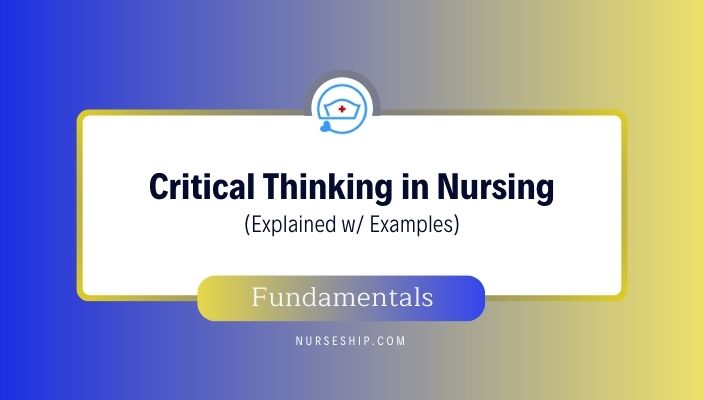
Last updated on August 23rd, 2023
Critical thinking is a foundational skill applicable across various domains, including education, problem-solving, decision-making, and professional fields such as science, business, healthcare, and more.
It plays a crucial role in promoting logical and rational thinking, fostering informed decision-making, and enabling individuals to navigate complex and rapidly changing environments.
In this article, we will look at what is critical thinking in nursing practice, its importance, and how it enables nurses to excel in their roles while also positively impacting patient outcomes.
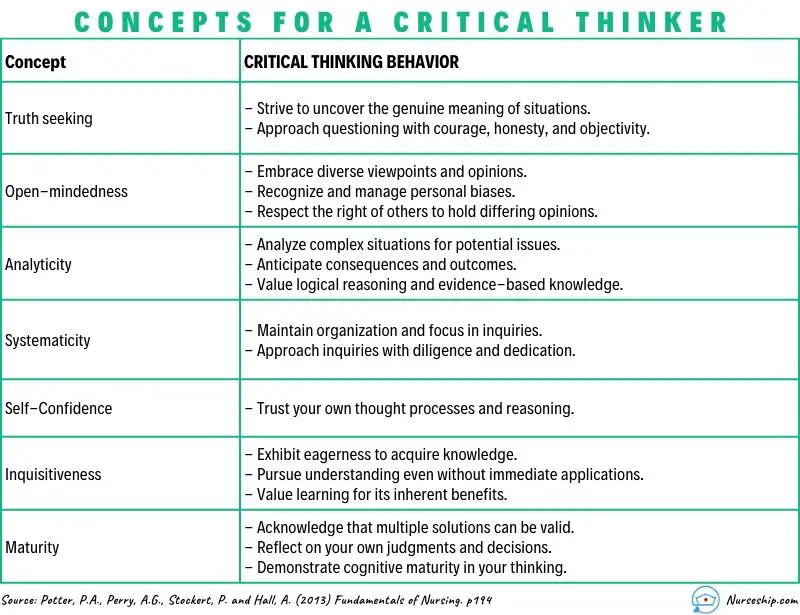
What is Critical Thinking?
Critical thinking is a cognitive process that involves analyzing, evaluating, and synthesizing information to make reasoned and informed decisions.
It’s a mental activity that goes beyond simple memorization or acceptance of information at face value.
Critical thinking involves careful, reflective, and logical thinking to understand complex problems, consider various perspectives, and arrive at well-reasoned conclusions or solutions.
Key aspects of critical thinking include:
- Analysis: Critical thinking begins with the thorough examination of information, ideas, or situations. It involves breaking down complex concepts into smaller parts to better understand their components and relationships.
- Evaluation: Critical thinkers assess the quality and reliability of information or arguments. They weigh evidence, identify strengths and weaknesses, and determine the credibility of sources.
- Synthesis: Critical thinking involves combining different pieces of information or ideas to create a new understanding or perspective. This involves connecting the dots between various sources and integrating them into a coherent whole.
- Inference: Critical thinkers draw logical and well-supported conclusions based on the information and evidence available. They use reasoning to make educated guesses about situations where complete information might be lacking.
- Problem-Solving: Critical thinking is essential in solving complex problems. It allows individuals to identify and define problems, generate potential solutions, evaluate the pros and cons of each solution, and choose the most appropriate course of action.
- Creativity: Critical thinking involves thinking outside the box and considering alternative viewpoints or approaches. It encourages the exploration of new ideas and solutions beyond conventional thinking.
- Reflection: Critical thinkers engage in self-assessment and reflection on their thought processes. They consider their own biases, assumptions, and potential errors in reasoning, aiming to improve their thinking skills over time.
- Open-Mindedness: Critical thinkers approach ideas and information with an open mind, willing to consider different viewpoints and perspectives even if they challenge their own beliefs.
- Effective Communication: Critical thinkers can articulate their thoughts and reasoning clearly and persuasively to others. They can express complex ideas in a coherent and understandable manner.
- Continuous Learning: Critical thinking encourages a commitment to ongoing learning and intellectual growth. It involves seeking out new knowledge, refining thinking skills, and staying receptive to new information.
Definition of Critical Thinking
Critical thinking is an intellectual process of analyzing, evaluating, and synthesizing information to make reasoned and informed decisions.
What is Critical Thinking in Nursing?
Critical thinking in nursing is a vital cognitive skill that involves analyzing, evaluating, and making reasoned decisions about patient care.
It’s an essential aspect of a nurse’s professional practice as it enables them to provide safe and effective care to patients.
Critical thinking involves a careful and deliberate thought process to gather and assess information, consider alternative solutions, and make informed decisions based on evidence and sound judgment.
This skill helps nurses to:
- Assess Information: Critical thinking allows nurses to thoroughly assess patient information, including medical history, symptoms, and test results. By analyzing this data, nurses can identify patterns, discrepancies, and potential issues that may require further investigation.
- Diagnose: Nurses use critical thinking to analyze patient data and collaboratively work with other healthcare professionals to formulate accurate nursing diagnoses. This is crucial for developing appropriate care plans that address the unique needs of each patient.
- Plan and Implement Care: Once a nursing diagnosis is established, critical thinking helps nurses develop effective care plans. They consider various interventions and treatment options, considering the patient’s preferences, medical history, and evidence-based practices.
- Evaluate Outcomes: After implementing interventions, critical thinking enables nurses to evaluate the outcomes of their actions. If the desired outcomes are not achieved, nurses can adapt their approach and make necessary changes to the care plan.
- Prioritize Care: In busy healthcare environments, nurses often face situations where they must prioritize patient care. Critical thinking helps them determine which patients require immediate attention and which interventions are most essential.
- Communicate Effectively: Critical thinking skills allow nurses to communicate clearly and confidently with patients, their families, and other members of the healthcare team. They can explain complex medical information and treatment plans in a way that is easily understood by all parties involved.
- Identify Problems: Nurses use critical thinking to identify potential complications or problems in a patient’s condition. This early recognition can lead to timely interventions and prevent further deterioration.
- Collaborate: Healthcare is a collaborative effort involving various professionals. Critical thinking enables nurses to actively participate in interdisciplinary discussions, share their insights, and contribute to holistic patient care.
- Ethical Decision-Making: Critical thinking helps nurses navigate ethical dilemmas that can arise in patient care. They can analyze different perspectives, consider ethical principles, and make morally sound decisions.
- Continual Learning: Critical thinking encourages nurses to seek out new knowledge, stay up-to-date with the latest research and medical advancements, and incorporate evidence-based practices into their care.
In summary, critical thinking is an integral skill for nurses, allowing them to provide high-quality, patient-centered care by analyzing information, making informed decisions, and adapting their approaches as needed.
It’s a dynamic process that enhances clinical reasoning , problem-solving, and overall patient outcomes.
What are the Levels of Critical Thinking in Nursing?
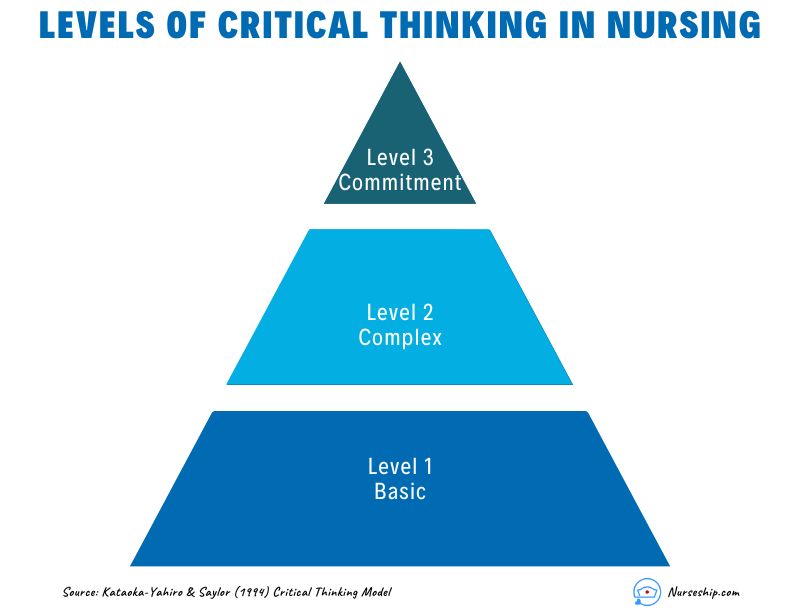
The development of critical thinking in nursing practice involves progressing through three levels: basic, complex, and commitment.
The Kataoka-Yahiro and Saylor model outlines this progression.
1. Basic Critical Thinking:
At this level, learners trust experts for solutions. Thinking is based on rules and principles. For instance, nursing students may strictly follow a procedure manual without personalization, as they lack experience. Answers are seen as right or wrong, and the opinions of experts are accepted.
2. Complex Critical Thinking:
Learners start to analyze choices independently and think creatively. They recognize conflicting solutions and weigh benefits and risks. Thinking becomes innovative, with a willingness to consider various approaches in complex situations.
3. Commitment:
At this level, individuals anticipate decision points without external help and take responsibility for their choices. They choose actions or beliefs based on available alternatives, considering consequences and accountability.
As nurses gain knowledge and experience, their critical thinking evolves from relying on experts to independent analysis and decision-making, ultimately leading to committed and accountable choices in patient care.
Why Critical Thinking is Important in Nursing?
Critical thinking is important in nursing for several crucial reasons:
Patient Safety:
Nursing decisions directly impact patient well-being. Critical thinking helps nurses identify potential risks, make informed choices, and prevent errors.
Clinical Judgment:
Nursing decisions often involve evaluating information from various sources, such as patient history, lab results, and medical literature.
Critical thinking assists nurses in critically appraising this information, distinguishing credible sources, and making rational judgments that align with evidence-based practices.
Enhances Decision-Making:
In nursing, critical thinking allows nurses to gather relevant patient information, assess it objectively, and weigh different options based on evidence and analysis.
This process empowers them to make informed decisions about patient care, treatment plans, and interventions, ultimately leading to better outcomes.
Promotes Problem-Solving:
Nurses encounter complex patient issues that require effective problem-solving.
Critical thinking equips them to break down problems into manageable parts, analyze root causes, and explore creative solutions that consider the unique needs of each patient.
Drives Creativity:
Nursing care is not always straightforward. Critical thinking encourages nurses to think creatively and explore innovative approaches to challenges, especially when standard protocols might not suffice for unique patient situations.
Fosters Effective Communication:
Communication is central to nursing. Critical thinking enables nurses to clearly express their thoughts, provide logical explanations for their decisions, and engage in meaningful dialogues with patients, families, and other healthcare professionals.
Aids Learning:
Nursing is a field of continuous learning. Critical thinking encourages nurses to engage in ongoing self-directed education, seeking out new knowledge, embracing new techniques, and staying current with the latest research and developments.
Improves Relationships:
Open-mindedness and empathy are essential in nursing relationships.
Critical thinking encourages nurses to consider diverse viewpoints, understand patients’ perspectives, and communicate compassionately, leading to stronger therapeutic relationships.
Empowers Independence:
Nursing often requires autonomous decision-making. Critical thinking empowers nurses to analyze situations independently, make judgments without undue influence, and take responsibility for their actions.
Facilitates Adaptability:
Healthcare environments are ever-changing. Critical thinking equips nurses with the ability to quickly assess new information, adjust care plans, and navigate unexpected situations while maintaining patient safety and well-being.
Strengthens Critical Analysis:
In the era of vast information, nurses must discern reliable data from misinformation.
Critical thinking helps them scrutinize sources, question assumptions, and make well-founded choices based on credible information.
How to Apply Critical Thinking in Nursing? (With Examples)
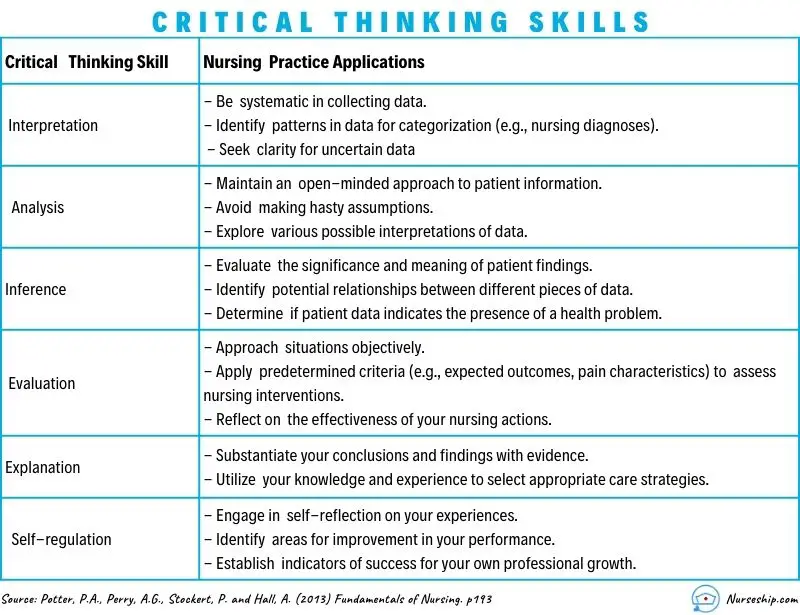
Here are some examples of how nurses can apply critical thinking.
Assess Patient Data:
Critical Thinking Action: Carefully review patient history, symptoms, and test results.
Example: A nurse notices a change in a diabetic patient’s blood sugar levels. Instead of just administering insulin, the nurse considers recent dietary changes, activity levels, and possible medication interactions before adjusting the treatment plan.
Diagnose Patient Needs:
Critical Thinking Action: Analyze patient data to identify potential nursing diagnoses.
Example: After reviewing a patient’s lab results, vital signs, and observations, a nurse identifies “ Risk for Impaired Skin Integrity ” due to the patient’s limited mobility.
Plan and Implement Care:
Critical Thinking Action: Develop a care plan based on patient needs and evidence-based practices.
Example: For a patient at risk of falls, the nurse plans interventions such as hourly rounding, non-slip footwear, and bed alarms to ensure patient safety.
Evaluate Interventions:
Critical Thinking Action: Assess the effectiveness of interventions and modify the care plan as needed.
Example: After administering pain medication, the nurse evaluates its impact on the patient’s comfort level and considers adjusting the dosage or trying an alternative pain management approach.
Prioritize Care:
Critical Thinking Action: Determine the order of interventions based on patient acuity and needs.
Example: In a busy emergency department, the nurse triages patients by considering the severity of their conditions, ensuring that critical cases receive immediate attention.
Collaborate with the Healthcare Team:
Critical Thinking Action: Participate in interdisciplinary discussions and share insights.
Example: During rounds, a nurse provides input on a patient’s response to treatment, which prompts the team to adjust the care plan for better outcomes.
Ethical Decision-Making:
Critical Thinking Action: Analyze ethical dilemmas and make morally sound choices.
Example: When a terminally ill patient expresses a desire to stop treatment, the nurse engages in ethical discussions, respecting the patient’s autonomy and ensuring proper end-of-life care.
Patient Education:
Critical Thinking Action: Tailor patient education to individual needs and comprehension levels.
Example: A nurse uses visual aids and simplified language to explain medication administration to a patient with limited literacy skills.
Adapt to Changes:
Critical Thinking Action: Quickly adjust care plans when patient conditions change.
Example: During post-operative recovery, a nurse notices signs of infection and promptly informs the healthcare team to initiate appropriate treatment adjustments.
Critical Analysis of Information:
Critical Thinking Action: Evaluate information sources for reliability and relevance.
Example: When presented with conflicting research studies, a nurse critically examines the methodologies and sample sizes to determine which study is more credible.
Making Sense of Critical Thinking Skills
What is the purpose of critical thinking in nursing.
The purpose of critical thinking in nursing is to enable nurses to effectively analyze, interpret, and evaluate patient information, make informed clinical judgments, develop appropriate care plans, prioritize interventions, and adapt their approaches as needed, thereby ensuring safe, evidence-based, and patient-centered care.
Why critical thinking is important in nursing?
Critical thinking is important in nursing because it promotes safe decision-making, accurate clinical judgment, problem-solving, evidence-based practice, holistic patient care, ethical reasoning, collaboration, and adapting to dynamic healthcare environments.
Critical thinking skill also enhances patient safety, improves outcomes, and supports nurses’ professional growth.
How is critical thinking used in the nursing process?
Critical thinking is integral to the nursing process as it guides nurses through the systematic approach of assessing, diagnosing, planning, implementing, and evaluating patient care. It involves:
- Assessment: Critical thinking enables nurses to gather and interpret patient data accurately, recognizing relevant patterns and cues.
- Diagnosis: Nurses use critical thinking to analyze patient data, identify nursing diagnoses, and differentiate actual issues from potential complications.
- Planning: Critical thinking helps nurses develop tailored care plans, selecting appropriate interventions based on patient needs and evidence.
- Implementation: Nurses make informed decisions during interventions, considering patient responses and adjusting plans as needed.
- Evaluation: Critical thinking supports the assessment of patient outcomes, determining the effectiveness of intervention, and adapting care accordingly.
Throughout the nursing process , critical thinking ensures comprehensive, patient-centered care and fosters continuous improvement in clinical judgment and decision-making.
What is an example of the critical thinking attitude of independent thinking in nursing practice?
An example of the critical thinking attitude of independent thinking in nursing practice could be:
A nurse is caring for a patient with a complex medical history who is experiencing a new set of symptoms. The nurse carefully reviews the patient’s history, recent test results, and medication list.
While discussing the case with the healthcare team, the nurse realizes that the current treatment plan might not be addressing all aspects of the patient’s condition.
Instead of simply following the established protocol, the nurse independently considers alternative approaches based on their assessment.
The nurse proposes a modification to the treatment plan, citing the rationale and evidence supporting the change.
This demonstrates independent thinking by critically evaluating the situation, challenging assumptions, and advocating for a more personalized and effective patient care approach.
How to use Costa’s level of questioning for critical thinking in nursing?
Costa’s levels of questioning can be applied in nursing to facilitate critical thinking and stimulate a deeper understanding of patient situations. The levels of questioning are as follows:
- 15 Attitudes of Critical Thinking in Nursing (Explained W/ Examples)
- Nursing Concept Map (FREE Template)
- Clinical Reasoning In Nursing (Explained W/ Example)
- 8 Stages Of The Clinical Reasoning Cycle
- How To Improve Critical Thinking Skills In Nursing? 24 Strategies With Examples
- What is the “5 Whys” Technique?
- What Are Socratic Questions?
Critical thinking in nursing is the foundation that underpins safe, effective, and patient-centered care.
Critical thinking skills empower nurses to navigate the complexities of their profession while consistently providing high-quality care to diverse patient populations.
Reading Recommendation
Potter, P.A., Perry, A.G., Stockert, P. and Hall, A. (2013) Fundamentals of Nursing
Comments are closed.
Medical & Legal Disclaimer
All the contents on this site are for entertainment, informational, educational, and example purposes ONLY. These contents are not intended to be used as a substitute for professional medical advice or practice guidelines. However, we aim to publish precise and current information. By using any content on this website, you agree never to hold us legally liable for damages, harm, loss, or misinformation. Read the privacy policy and terms and conditions.
Privacy Policy
Terms & Conditions
© 2024 nurseship.com. All rights reserved.

IMAGES
VIDEO
COMMENTS
Critical thinking in nursing requires self-awareness and being present in the moment. During a hectic shift, it is easy to lose focus as you struggle to finish every task needed for your patients. Passing medication, changing dressings, and hanging intravenous lines all while trying to assess your patient's mental and emotional status can ...
Why Are Critical Thinking Skills in Nursing Important? Critical thinking is an essential skill for nursing students to have. It's not something that it can teach in a classroom, and it must be developed over time through experience and practice. Critical thinking is the process of applying logic and reason to make decisions or solve problems.
4 Consequences of Poor Critical Thinking in Nursing Critical thinking in nursing is essential to promote positive patient outcomes and build strong healthcare teams. Weak critical thinking skills can manifest in various ways, including inaction when action is needed, poor decision-making, and disinterest on the part of nurses.
Current: General Nursing Why Critical Thinking Skills in Nursing Matter (And What You Can Do to Develop Them) By Hannah Meinke on 07/05/2021
One example of critical thinking in nursing is interpreting these changes with an open mind. Make impartial decisions based on evidence rather than opinions. By applying critical-thinking skills to anticipate and understand your patients' needs, you can positively impact their quality of care and outcomes. Elements of Critical Thinking in Nursing
The Importance of Critical Thinking Skills in Nursing. The fast-paced nursing environment requires prompt, data-driven decisions. Nurses use critical thinking daily, reviewing information and making decisions to promote quality care for patients. The following benefits of critical thinking highlight the importance of this skill in nursing careers:
Master Critical Thinking. Take your nursing career to the next level by learning to master critical thinking for better patient care. Learn how to pursue your degree in nursing with Carrington College. Sources [1] Papathanasiou, I. et al. "Critical Thinking: The Development of an Essential Skill for Nursing Students."
1. Nurses' Critical Thinking Heavily Impacts Patient Care. Shantay Carter is a nurse, mentor, public speaker and author who also runs a non-profit dedicated to empowering and educating women. Carter believes strongly in the importance of critical thinking in nursing, saying, "Nurses must be able to think critically in order to anticipate ...
Why critical thinking is important in nursing? Critical thinking is important in nursing because it promotes safe decision-making, accurate clinical judgment, problem-solving, evidence-based practice, holistic patient care, ethical reasoning, collaboration, and adapting to dynamic healthcare environments.
Why is Critical Thinking Important in Nursing? Nurses play a critical role in patient care. When someone is sick, they count on nurses to administer their care, track their health, and communicate with their doctor to help them get better. Nurses who excel in critical thinking can substantially better perform these tasks, setting themselves up ...